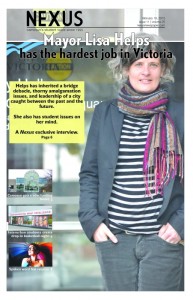Once upon a time there were three princes who set out from their kingdom of Serendip for a bit of a lark. They went over land and over sea, met some fine folks, and through a happy accident that none of them were expecting, they all came back home fabulously wealthy.
Come to think of it, a lot of the best stories end up being the ones where we set out not knowing where we’re going or how, exactly, to get there. What would The Hobbit have been like if Bilbo and Gandalf had GPS smartphones to get them through the mountains?
I was thinking of those three princes the other day while wandering around downtown. Their adventure gave us the English word serendipity, and it was just that, “a happy accident,” when I came across a chocolate store on Fort Street I had never seen before. Instead of the two-inch screws I was searching for, I had a two-inch chocolate coated in marzipan. Way better.

Despite that admittedly banal example, serendipity, or “discovering something incredible that you didn’t even know you were looking for,” as it’s defined, is found in more than just stories. One estimate is that nearly 50 percent of scientific discoveries come about through some form of chance, everything from microwave cooking to antibiotics… and that even includes LSD.
The problem is that we seem to crave lives in which the discomfort and uncertainty of surprise have been removed.
One of the worst culprits is our shopping habits.
It feels like such an effort to wander through a bookstore, or stroll about the downtown shops, when one-click shopping gets us exactly what we want without even having to leave the house. Does anyone even go and just hang out at the mall anymore?
The thing is, what we think we want and what we actually want are sometimes really different things. And without an element of randomness or chance, we might never have the opportunity to discover the difference.
We seem to distrust our ability to find things on our own. We rely on Netflix’s algorithms to suggest our viewing schedule, Songza and Spotify to select our music.
“Recommended for you,” they cheerfully suggest. Recommended based on what? The same-old action-flick rut I seem to be stuck in?
The problem with algorithms is that they can’t provide us with anything truly spontaneous.
There’s a lot to be said for the insights that come out of big data, and perhaps if we were all average citizens, those insights would be valid. But no matter how good their algorithms, Amazon will never be able to land me in a chocolate store when I was looking for hardware. Calculated and spontaneous can just never be the same.
In the 1960s, John Lennon was singing “Give Peace a Chance.” If he were around today, he might be chanting “Give chance a chance.”
Here’s for a little bit of spontaneity, a little bit of chance, and a bit of time for serendipity to thrive.
